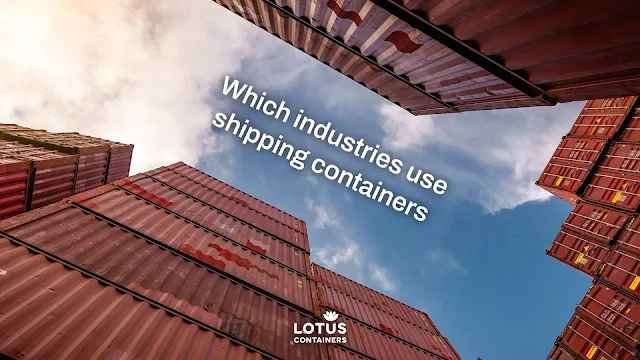Which industries use shipping containers?
Various industries use shipping containers to transport food products, pharmaceuticals, chemicals, and fragile and hazardous goods across borders. The utilisation of shipping containers can be seen across various industries as they must carry out import-export businesses. Shipping containers offer unparalleled flexibility and versatility and can, therefore, fit any form of goods- solid, liquid, gas, in any dimension. Different types and sizes of shipping containers are suitable for the various industries to store and transport their goods internationally.
Importance of shipping containers
Shipping containers are conex boxes manufactured out of corrugated steel to store and transport different types of cargo internationally. These freight containers are made of recyclable steel and, therefore, are environmentally sustainable and have an average lifespan of 25 years. Container manufacturers sell the shipping containers to container leasing companies or shipping lines. From there, traders or organisations can lease or buy shipping containers based on different leasing agreements.
The need for shipping containers arose as exporters received demands for shipping different types of cargo- dry, bulk, liquid, gases, and perishables. Shipping containers are designed to support all these shipping needs and are available in different dimensions and types. The container industry offers flat rack, reefer, isolated, double door, and tank containers, among various types of containers. Container sizes range from 10ft, 20ft, 40ft, 45ft, and 53ft, which can be standard and high cube containers. Shipping containers can transport all sorts of cargo and thus benefit various industries.
How do shipping containers enhance logistics and supply chain management?
The concept of shipping containers began in 1956 when Malcolm McLean invented the first standard shipping container and revolutionised the logistics industry. Before it, all sorts of cargo had to be separately loaded into barrels or wooden boxes to be manually loaded onto ships. It took a lot of time and was not efficient. With the advent of containers, cargo can be consolidated and shipped internationally faster and more efficiently.
The logistics industry uses containerisation to load containers with different types of cargo. The versatility, flexibility, sustainability, and durability of shipping containers have revolutionised cargo movement throughout the supply chain.
Cargo containers are perfectly suitable for intermodal transport and can be moved from one mode of transportation to another without many challenges.
There are different containers to accommodate the shipping needs of various cargo.
Freight containers are weather-resistant and can be painted to make them rust-proof. It helps prevent cargo damage and maintains the integrity of goods stored.
They increase productivity and efficiency by easily and comfortably handling, loading, and unloading containers.
Which industries use shipping containers?
Automobile industry- Different countries import various cars, bikes, and trucks from countries that build sturdy models. Precise and controlled container handling is required to prevent automobiles from damage while loading, unloading or transportation. Automotive industry container shipping is fulfilled using roll-on/roll-off (RoRo) containers with a built-in platform to accommodate vehicles quickly loaded and unloaded from containers to facilitate easy and safer handling. High cube dimensions are suitable for transporting automobiles with high volume.
Pharmaceutical industry- The medicinal industry requires transporting medicines such as injections, vaccines, drugs, organs, and often some samples for use. Maintaining the temperature and humidity inside containers to store them and prevent them from damage during shipping is crucial. Reefer containers are refrigerated containers with temperature controls to facilitate cargo delivery at low and suitable temperatures.
Chemical industry- It deals with expensive and hazardous goods of prime economic value to the trade industry. Different types of liquids and gases need to be shipped internationally to fulfil the demands of the supply chain. Drum and tank containers are suitable for carrying hazardous and non-hazardous liquids and gases. Flexitanks can transport liquid goods such as fuel, petroleum, edible oils, etc.
Food industry- One of the primary users of shipping containers is the exporters and importers of food products. Dry food products can be packed into crates and shipped using dry containers. Fresh or temperature-sensitive food products such as dairy, meat, fruits, and seafood require storage and transportation at controlled temperatures. Reefer containers are a suitable option for transporting perishables overseas. The container ensures temperature regulations, helps restore the shelf life, and reduces cargo damage.
Mining industry- Heavy bulk cargo such as coal, iron ore, gravel, and lower-volume sand must be shipped in appropriate containers. High-cube containers are not the best choice in such cases. Therefore, mining industries ship their goods into half-height containers. It helps utilise the entire container space and enables easy loading and unloading of shipping containers.
These few industries use shipping containers to facilitate global trade and import and export goods from a cheaper marketplace.
LOTUS Containers is a one-stop solution for all sorts of shipping containers. We sell and lease different types of shipping containers available in all dimensions. You can contact us if you are looking for old or new shipping containers.



Comments